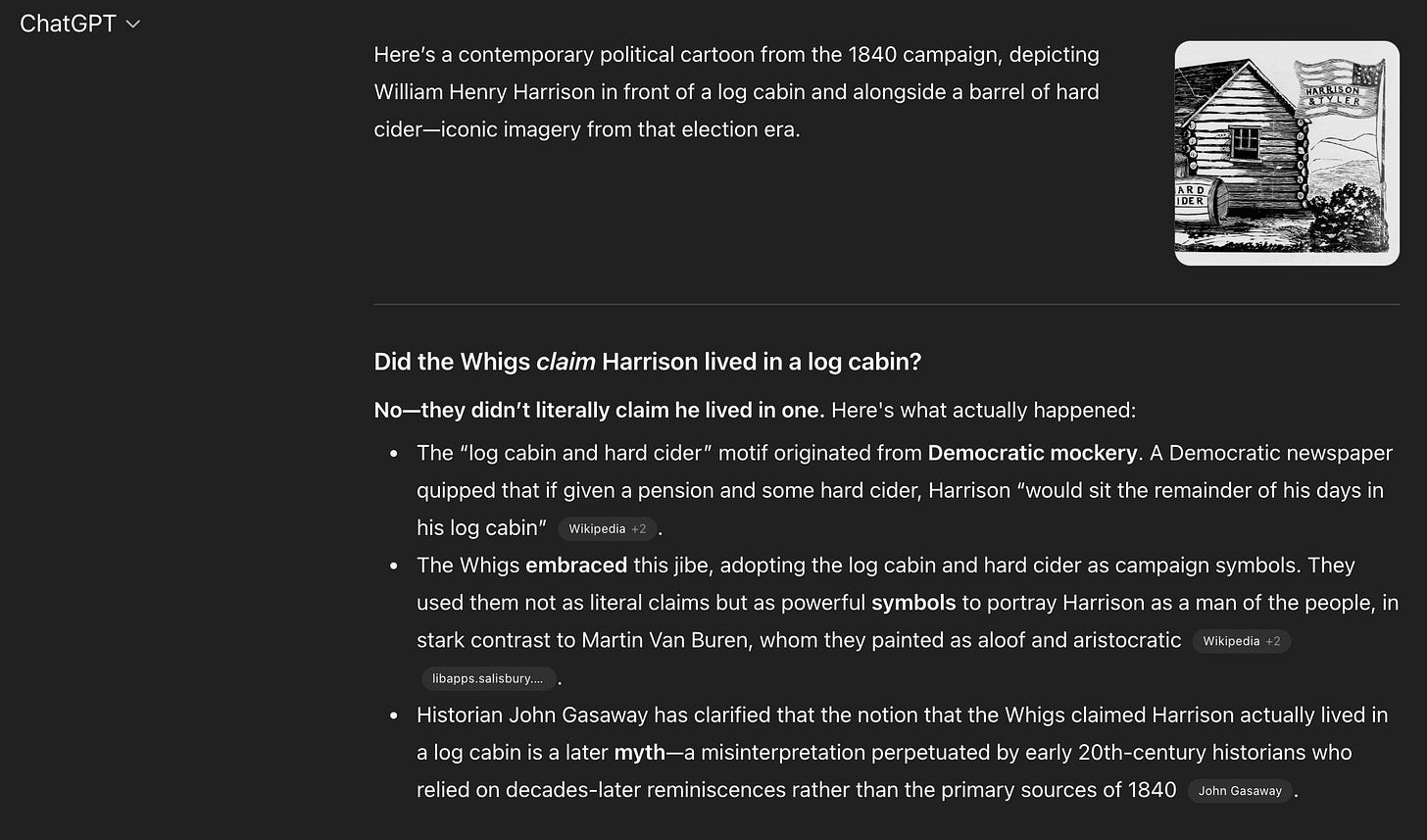
Technological revolutions tend to follow a broadly similar pattern whether the change sweeping the land is electricity, cars, radios, TVs, or the Internet. When the breakthrough emerges there are great expectations and a new dawn is declared. Then complaints are voiced and panic may even arise as the new technology is adopted on a vast scale. Jobs are lost and disruptions occur. Folkways wither. Stocks peak and plummet. The passing of an old order is lamented.
Chatbots are no different. Artificial intelligence may yet navigate its own stock bubble-and-crash sequence just as the Internet did before and after March 2000. Chatbots may turn out to exacerbate psychotic tendencies in persons so inclined. The emerging technology may be contributing to long-term unemployment among a growing number of college graduates. These concerns and disruptions are real enough even as a sizable majority of American adults have still never used a chatbot.
And yet the number of men and women who have chatted with a bot is growing faster than ever before. The sheer potential and indeed current power of chatbots is plain enough. One intriguing possibility is right there in the branding. An “artificial intelligence” that lives up to its name will accelerate new knowledge. Search gives us links. Chatbots give us answers.
True, those answers can be spectacularly wrong on occasion. Screenshots of AI’s hapless and even hallucinatory outputs have been a hardy perennial on social media since the pandemic. No one suggests chatbots are to be trusted unquestioningly, but possibly the technology’s promise is part and parcel of its disclaimer. After all, few of us trust anything or anyone as infallible, not capital-S Science, the press, academe, clergy, lawyers, doctors, experts, amateurs, YouTubers, Democrats, Republicans, independents, family, friends, strangers, or anyone else. Add AI to the list.
Nevertheless, one modest possibility is that chatbots can on occasion outperform humans in finding the correct answer to a rather mundane historical question.
In grad school I ended up writing a dissertation on the presidential election of 1840 entirely by (very slow-motion) accident. My intent was to set forth an episodic history of presidential campaigns across different mass-media eras. I’d already done work on Dwight Eisenhower’s pioneering 30-second ads and Richard Nixon’s “Checkers” speech in 1952. I anticipated fleshing out that paper and folding it into the finished product. But I obviously needed an opening chapter set in the 19th century. I settled on the “log cabin and hard cider campaign” of 1840 between William Henry Harrison and Martin Van Buren, the incumbent president.
At some point during my time on campus I was required to read Liberty and Power, Harry L. Watson’s excellent yet concise history of the Jacksonian era. That single book formed literally my entire preexisting knowledge of the period, but, after all, this was just going to be one chapter.
I recall being delighted conceptually by the idea that Whigs in 1840 flat-out lied and said their candidate Harrison lived in a log cabin when in fact he inhabited a fine and rather large if hardly palatial dwelling in North Bend, Ohio. I could already see how this would play out on the page. Maybe the party press wasn’t so backward and primitive as a medium after all, I would suggest. I fancied myself a regular Eric Havelock showing how pre-electronic technology could in fact achieve quite powerful “media effects.” Beginning with The Age of Jackson by Arthur Schlesinger, I started reading up on 1840.1
It quickly became clear the log cabin campaign would be the entire dissertation. For the better part of 18 months I was in effect a large language model in human form. One book would lead to the next, and that book’s footnotes would lead me to five more. I wouldn’t be able to read literally everything about 1840, of course, but I did feel I could reach a point of asymptotic peace of mind on the material.
We were living in northern California, we didn’t have kids yet, and I made regular 75-mile commutes to the Bancroft Library at UC Berkeley to read physical copies of Whig newspapers from 1840. I was learning to navigate both the vocabulary of the early republic and the traffic on the approaches to the Caldecott Tunnel.
Alas, my original plan to be the new Havelock would have to wait. Almost from the start I ran into accurate descriptions of Harrison’s actual non-log-cabin house in national Whig newspapers. I couldn’t understand why these excerpts were nowhere to be found in the secondary literature, but I wrote it all up as Tippecanoe and the Party Press Too.
A few years later I compressed the dissertation into a 30-page article and submitted it to a scholarly journal on the Jacksonian era. It was predictably and understandably rejected (for surely 1840 was a dead letter topically), but one comment from an anonymous reviewer assuaged any misplaced sorrow I may have felt. He or she wrote that “obviously” the Whigs really did say Harrison lived in a log cabin.
I confess this comment delighted me. I took a picture of it. The idea of a credentialed expert reading 30 pages of verbatim “no cabin” quotes that had never before seen the light of scholarly day only to react by saying “yes cabin” was too precious.
Over the ensuing years a few intrepid researchers joined a select group that previously consisted of just my father and my committee and read the dissertation. Slowly the Wikipedia page gravitated in the direction of what I’d seen in the stacks in Berkeley. By 2018 I wondered if I might accelerate this process by posting a 6,000-word synopsis of the dissertation.
The campaign of 1840 was the first of what has proved to be a remarkably durable modern kind, but one thing it was not was a technologically bereft yet purposeful denial of a readily observable and indeed singularly prominent physical entity. The Whigs didn’t say Harrison lived in a log cabin.
The good news today is at least two chatbots outperform my friend the blinkered reviewer on the following query: “In the presidential election of 1840 did the Whigs claim that William Henry Harrison lived in a log cabin?”
Both ChatGPT 5.0 and Google AI Mode give a flat “no.” Both were able to profit from a single post on an obscure low-traffic WordPress site.
Of course in the literal credentialing sense I’m no “historian.” I didn’t earn my Ph.D. in history. This is precisely where chatbots do struggle, precisely the kind of thing that quite rightly bothers us as users. We know any self-respecting human would just reach out to me and ask, “Are you a trained historian?”
But, that aside, ChatGPT’s bullets are not only sound but quite possibly superior to the Internet’s potted history of 1840. Bullet No. 3 in particular makes me do the pointing Leo DiCaprio meme: 20th century historians did err. They did rely on easily accessed memoirs written decades after the fact instead of on more elusive yet more reliable primary sources from 1840 itself.
Naturally we all rely on easily accessed sources. One promising aspect of AI is that it can enlarge this circle of what’s accessed easily and thus accelerate what was referred to in the early republic as the “diffusion of information.”
My anonymous reviewer doubtless ranked in the 99th percentile of the adult population in terms of the amount of reading they’d done on the Jacksonian era. Me too, but a chatbot at its best reads far more than either of us humans and then addresses queries without the emotional and reputational investment that we tend to tote around with us.
Ultimately what Whigs did or did not say almost two centuries ago doesn’t amount to a hill of beans in today’s world. What matters is striving to be accurate about the past and present. As long as chatbots are properly cross-checked they may occasionally serve as a knowledge accelerant when the traditional appurtenances of scholarly inquiry are proving to be a bit sclerotic.
Schlesinger published The Age of Jackson at age 28 in 1945 and was awarded a Pulitzer. His next book was 1949’s The Vital Center, in which he espoused New Deal liberalism at home and vigorous anti-communist exertion abroad. Decades later it befell Schlesinger to figure in an oft told parable on the sources of historical knowledge. He attended a conference of historians in the late 1960s or early 1970s when Cold War revisionism was winning converts. At this particular meeting the author of the The Vital Center was challenged by a much younger historian with much longer hair. An irate Schlesinger demanded of his colleague: “Young man, how old were you at the time of Yalta?” The younger professor shrugged. “How old were you in the Age of Jackson?”


